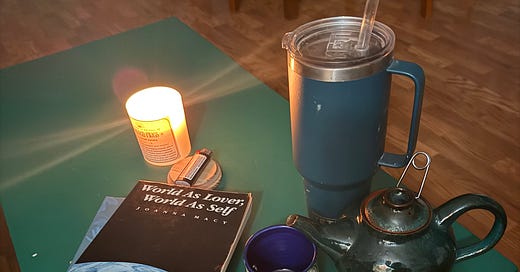Heading Into Grand Canyon Prioritizing The Art of Rest
As I’m heading into The Colorado River in Grand Canyon to help co-facilitate an amazing trip with The Freeflow Institute, I’m reflecting on all of the ways I protect my rest, stress, and sleep while I’m working in a backcountry setting. I love reflecting on how my backcountry life has provided a sense of clarity towards my relationship with rest, stress, and sleep. While I am working in the backcountry, I have very, very little personal time and I must make every moment count.
When every moment counts, I find that simplicity is the best tool.
I also find, that when every moment counts, creative practice becomes even more important to my stress management and sense of vitality in a busy setting, not less!
One way that I keep myself grounded is to give myself the container of a small, completely do-able creative practice that I can honor each day. On this Grand Canyon trip I am planning on writing one haiku a day to capture my experience.
I love haikus because they are simple. Short. Sweet. They cut to the heart of the matter. They distill the most salient information of our present moment. I can write a haiku even when I am dog-tired.
What is a haiku?
If you pop “haiku” into Google, their experimental AI generator will spit this out for you:
Haiku are typically written with a three-line structure, totaling 17 syllables: 5 in the first line, 7 in the second, and 5 in the third. While there's no strict rhyme, a traditional haiku often includes a "cutting word" (kireji). Additionally, a kigo, or seasonal reference, is common.
Here's a more detailed breakdown:
Three Lines: The haiku form consists of three lines.
17 Syllables: The total number of syllables across all three lines is 17.
Syllable Count:
Line 1: 5 syllables.
Line 2: 7 syllables.
Line 3: 5 syllables.
No Rhyme: Haiku typically do not follow a rhyme scheme.
Kireji (Cutting Word): A kireji is a word or phrase that marks a transition or a shift in meaning, often placed at the end of the poem.
Kigo (Seasonal Reference): A kigo is a word or phrase that indicates a specific season.
Focus on Nature: Haiku often explore nature, but can also touch on other themes.
Imagery: Haiku tend to present vivid images or a single moment in time, according to the Poetry Foundation.
Finding Your Own Art of Rest
For the remainder of April, this month our restful creative practice invites you to engage in a haiku practice of your own. Although I’ll be writing one haiku a day while I’m gone, your invitation is to think about which frequency of this restful practice might work best for you. Is it once a day? Is it once a week?
It is also useful to figure out when you’re going to engage in this practice. Will you do your haiku at the end of the day to solidify the imagery as a memory and a way to ‘book end’ your evening to help you drift off to sleep? Will you start your haiku practice first thing in the morning to engage in a check-in with yourself on where your mood, thoughts, and attention wants to go for the day? If you’re only writing one haiku once a week, will you want to create more intentional ritual around it on a cozy Sunday after grocery shopping is done?
There’s no wrong way to do this, however doing with intention is the most likely way we’ll follow through.
I’d love to catch your poems upon my return.
As per usual, I am so passionate about hearing how we each, individually pursue The Art of Rest. If you’re interested in sharing your restful haikus with me while I’m away, please feel free to do so. I’d love to hear what’s moving through your world when I return.
Thank you for being here,
I’ll be sending you as much rest as I can from the bottom of the ditch.
Lovingly, mindfully, wildly,
Dagny Rose
This sub-section of The Art of Rest, is all about—you guessed it—The Art!
Here we explore the creative practices that bring vitality into our lives. Whether we are creating for the pure joy of it, finding ways to have our art help make our lives better, or intentionally honing in on our creative practices, “The Art” is going to regularly touch into our creative pulse5.
Looking For A Personalized Way to Optimize Your Rest?
I am wrapping up my springtime guidance-work for the season! I offer individualized 1:1 guidance for those who want to use rest as a way to expand their creativity, folks who just need a tune up, all the way towards people who might be dealing with chronic rest related issues. Shoot me an email at dagnyrose@theartofrest.me to inquire about getting started. My final spring booking spots for spring are April 28 - June 10 and they are filling up fast. Keep an eye out for summer booking slots when I’m back around.




